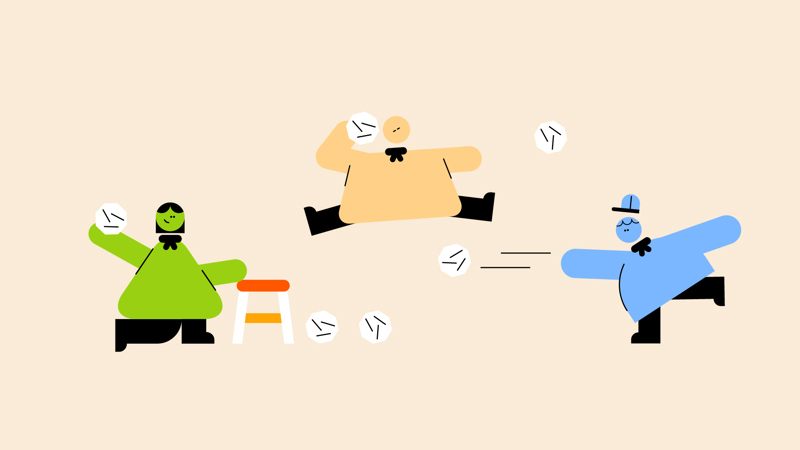
Sustainable ‘snowball’ fight
You’ll need
- Scrap paper
- Pens
- Post-it notes
- Sticky dots (optional)
Before you begin
- In the weeks leading up to this activity, monitor the waste your group produces. How you do this is up to you – you may want to write a list, take pictures, or even store the rubbish (if it’s clean, like paper or washed up plastic).
- Find out how you recycle (and what can be recycled) in your local area, using recyclenow.com.
Have a ‘snowball’ fight
- Show everyone the waste your group has made over the past few weeks. Talk about the type of materials it’s made of, as well as the amount. What do people already know about recycling where you live?
- Everyone should think about ways their group could reduce the amount of waste they produce, or reuse or recycle the waste they produce.
- Give everyone a few pieces of scrap paper and a pen. Everyone should write their ideas on scrap paper, with one idea on each piece of paper.
- Everyone should scrunch up their pieces of paper, to turn them into snowballs.
- It’s time to have a snowball fight!
- After a few minutes, everyone should stop throwing snowballs and stand still. They should pick up the snowball closest to them.
- One by one, everyone should read the idea they’ve picked up to the group. If any ideas are similar or the same, those people can stand together.
- Everyone should work together to narrow down their ideas. They could do this by eliminating any that are impractical, for example, because they’re too difficult or expensive.
- Discuss the ideas that everyone has chosen, and decide how you will remember them.
- Recycle the scrap paper snowballs.
- Set a date in a few weeks, to review how your plan is going.
Reflection
"It may be useful to reflect twice – once at the end of making your plan, and then again in a few weeks once you’ve reviewed how your plan is going.
This activity will help you develop a range of practical and contemporary skills. Did you learn any skills which might help you make decisions in the future? Did you learn how to negotiate with people? Do you know how to find out about local recycling now? Do you know how you can reduce, reuse, and recycle your waste? How might you use these skills at school, or at home? Could any parts of your plan work in places other than your meetings?
This activity also gives you the opportunity and skills to be responsible and trustworthy. Can you be trusted to do what you say you will – for example to stick to your plan, even if it’s hard? What makes reducing, reusing, and recycling the right thing to do? Have you tried your best to stick to your plan, even when no one was watching? How did it go?"
Safety
All activities must be safely managed. You must complete a thorough risk assessment and take appropriate steps to reduce risk. Use the safety checklist to help you plan and risk assess your activity. Always get approval for the activity, and have suitable supervision and an InTouch process.
Split into small teams for a less chaotic snowball fight, or replace it with another, calmer, game like building a snowman or choosing from a ‘lucky dip’ of scrunched up ideas.
All Scout activities should be inclusive and accessible.
This activity could also consider the waste produced at an event such as a camp.
